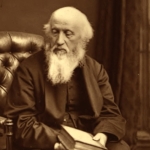When in Wisconsin where I once had time
the flyway swans came whistling
to the rotten Green Bay ice and stayed,
not feeding, four days, maybe five, I shouted
and threw stones to see them fly.
Blue herons followed, or came first.
I shot a bittern’s wing off with my gun.
For that my wife could cry.
My neighbor’s wife mistook the spawning frogs
for wood ducks nesting the white pines
up on Bean Hill: I straightway
set her right. Each April, on the first
rainy night I lantern-hunt for salamanders
where they hide, toewalking the bottom
mucks and muds. I shudder
at the scored skin of their sides, the deep
flesh tucks. In hand, they dry. I walk
in frogspawn jellies on my lawns. One time I hoped
the great white birds might brake
for the frog ditch and alight,
but all the addled past falls in on itself,
splash rings close inward on the rising stone,
my gun sucks fire, the bone becomes
whole bone, light narrows back
on point and filament, the forest turns to sand,
and only season lacking source rolls round
and round, till I in my turns fall forever back
clutching my stone, my gun, my light.
When in Wisconsin where I once had time
and spring beasts gorged my marrows and my tongue,
I was not blind: the red eft clambered
in my eye.




















Comment form: